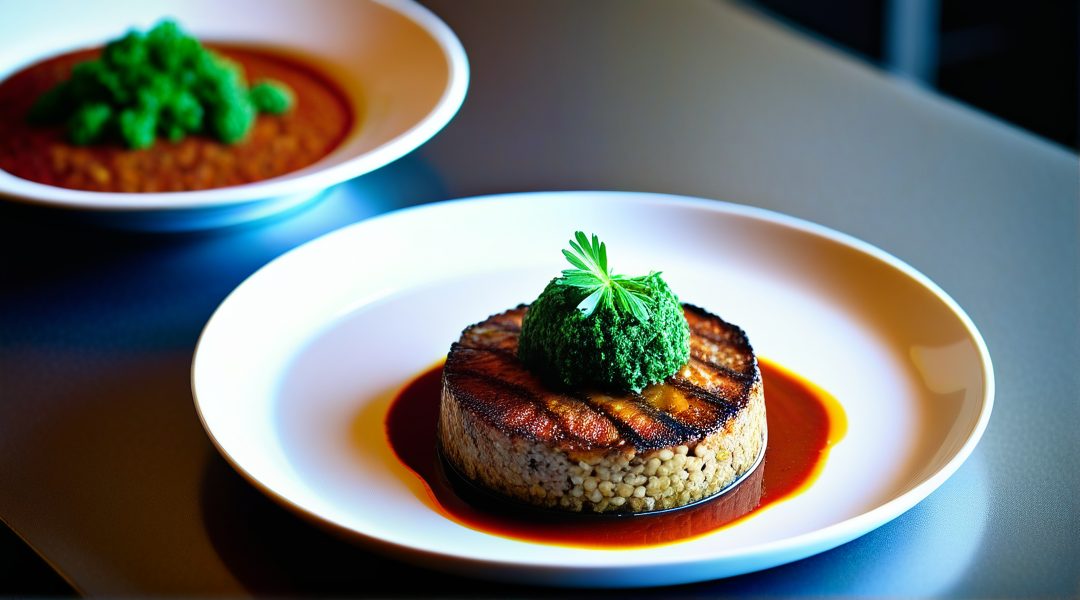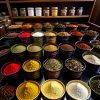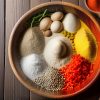
 In the clamor of the kitchen, surrounded by the clang of steel, the hiss of fire, and the rhythmic thud of knives on wood, you start to feel it: the transformation happening right before your eyes. It’s not just the food. It’s you, the space, the chaos of life outside distilled into something tangible and fleeting. Being a chef isn’t about recipes or accolades. It’s about creation, destruction, and finding a fleeting moment of transcendence amid the grind. It’s alchemy. And like the alchemists of old, chefs are seekers—of flavor, of meaning, of that impossible, unattainable perfection.
In the clamor of the kitchen, surrounded by the clang of steel, the hiss of fire, and the rhythmic thud of knives on wood, you start to feel it: the transformation happening right before your eyes. It’s not just the food. It’s you, the space, the chaos of life outside distilled into something tangible and fleeting. Being a chef isn’t about recipes or accolades. It’s about creation, destruction, and finding a fleeting moment of transcendence amid the grind. It’s alchemy. And like the alchemists of old, chefs are seekers—of flavor, of meaning, of that impossible, unattainable perfection.
There’s a reason kitchens attract the dreamers, the misfits, the people who don’t quite fit into the smooth edges of everyday life. The kitchen is one of the last places where chaos and control dance together, where transformation is not just possible but demanded. Chefs are not mere cooks; they are alchemists in aprons, wielding knives instead of philosopher’s stones, standing over modern-day crucibles that crackle and spit. They take the raw and ordinary and conjure the extraordinary.
This isn’t a glamorous process. It’s hot, dirty, and relentless. It’s not for the faint of heart, nor for those chasing easy rewards. But for those who feel the pull of the kitchen, there is no other path. The work is grueling, the hours unforgiving, but the moments of magic make it worthwhile. There’s nothing quite like watching a pile of raw ingredients transform into something that makes someone’s eyes light up. It’s fleeting, ephemeral—but in that brief moment, it’s everything.
At its core, being a chef is an act of rebellion. It’s about taking the mundane—the kind of things the world discards—and transforming it into something sublime. Or maybe it’s the pursuit of meaning, the belief that within every humble potato, every scrap of bone, there lies the potential for something divine. There’s a deeper undercurrent here, one that runs parallel to life itself: in the act of turning something ordinary into something profound, the chef mirrors the human desire to rise above the meaningless chaos of existence and create something that matters.
The Ingredients: Crude Beginnings
Every alchemist begins with base metals—lead, tin, copper. Things unremarkable on their own but full of hidden potential. For chefs, these are the raw ingredients. The gnarled root vegetables, the forgotten scraps of bone, the overripe tomatoes. These aren’t luxuries; they’re challenges. And they’re where the magic begins.
A carrot, covered in dirt, might not look like much. But peel away the rough exterior, and you find sweetness and earthiness waiting to be unleashed. Onions, pungent and harsh when raw, transform into something caramelized and golden under the right heat. Even the bones—discarded by butchers and home cooks alike—become the backbone of a stock that feeds the soul as much as the body.
Chefs don’t just look at ingredients; they listen to them, touch them, understand them. A tomato that has soaked up too much sun isn’t a flaw—it’s a story waiting to be told through a sauce or a stew. An underripe fruit isn’t a mistake; it’s an opportunity to play with textures and flavors. The chef’s first tool isn’t a knife but their perspective, the ability to see what others miss.
This is where alchemy comes alive. Just as alchemists saw gold hidden within the roughest of metals, chefs see potential in every ingredient. This is why some of the greatest dishes in history have come not from abundance but from scarcity. French onion soup, cassoulet, even paella—all born from the need to make something from nothing, to conjure greatness from scraps.
Ingredients are also more than objects; they’re connections. A potato carries with it the memory of the soil, the hands that harvested it, the history of its cultivation. A good chef doesn’t just use ingredients; they honor them, recognizing that every piece of food has a story to tell. There’s a silent dialogue between the chef and their mise en place—a conversation about potential, about transformation, about life itself.
The challenge of ingredients lies in their simplicity. Anyone can make truffles and foie gras taste luxurious. But it takes a certain kind of genius to turn lentils, onions, and a handful of spices into something that feels like home. This is the alchemy of the everyday, and it’s where chefs prove their mettle—not with rare ingredients but with their ability to transform the ordinary into the extraordinary.
Fire as the Crucible: The Elemental Power of Heat
Fire is the chef’s oldest ally and fiercest enemy. It’s the element that separates us from the animals, the force that turns raw into cooked, potential into reality. But fire doesn’t just transform food; it demands something from the chef. It demands control, respect, and a willingness to take risks.
To an alchemist, fire was the crucible—the tool through which transformation occurred. For a chef, it’s the grill, the stovetop, the oven. It’s the roaring flame that kisses a steak with a perfect sear or the gentle simmer that coaxes flavor out of a pot of broth. It’s also the threat, the constant danger of going too far, of burning instead of caramelizing, of destroying instead of creating.
Fire teaches patience. It teaches humility. You learn to read its moods, to sense its intentions. A roaring grill at the height of service is not a machine; it’s alive, and it demands your attention. You don’t control fire; you collaborate with it, coaxing it to do your bidding while knowing it could betray you at any moment.
This relationship with fire is not just about cooking; it’s about resilience. Every chef has been burned—literally and figuratively. The scars on a chef’s hands aren’t just battle wounds; they’re reminders of lessons learned, of the times when fire wasn’t kind. And yet, we return to it, day after day, because without fire, there is no transformation.
Fire, in its rawest form, is a metaphor for life. It can warm or destroy, create or consume. The challenge lies in taming it just enough to make it serve you without losing its wild edge.
Fire is also the ultimate equalizer. It doesn’t care if you’re a Michelin-starred chef or a line cook working the overnight shift. It treats everyone the same, rewarding precision and punishing arrogance. To stand over a flame is to understand both its power and your own limitations. You can never fully control it, but if you learn to work with it, it will reward you with transformation.
Destruction as Creation: The Necessary Chaos of Cooking
In alchemy, destruction is not a failure but a necessary step toward creation. Nothing transformative happens without first breaking down what was there before. For chefs, this truth is woven into the fabric of their work. Every great dish begins with the destruction of something else. Garlic is smashed, bones are shattered, and herbs are torn apart. These acts of culinary violence aren’t mindless; they’re purposeful, deliberate steps in the process of transformation.
Destruction in the kitchen isn’t just a mechanical process; it’s a philosophy. To coax greatness from humble ingredients, they must first be undone. A tomato reaches its highest potential not when it’s whole, but when it’s crushed into a rich, simmering sauce. A fish yields its best only after its bones are meticulously removed, leaving behind a clean, tender filet. Even bread, the most elemental of foods, begins with the destruction of wheat, the grinding of kernels into flour, and the taming of that dust with water and fire.
But destruction doesn’t stop with the food. The chef is also part of this process. Each shift is a crucible, grinding away at body and soul. Burns, scars, and cuts become the chef’s roadmap of sacrifice, physical reminders of every mistake and every lesson learned. The exhaustion after a dinner rush, the aches that settle in as you finally step away from the stove—these are the costs of creation.
Even psychologically, the destruction is constant. The kitchen demands perfection, but it also demands speed. Plates are returned, dishes are sent back, and the margins for error are razor-thin. A single overcooked steak can spiral into chaos, leaving you scrambling to recover. And yet, for all this destruction, chefs continue. They endure because they understand that creation is born from breaking things down.
The beauty of destruction lies in its honesty. Cooking doesn’t hide the costs of creation. It demands that you face them, embrace them, and use them to build something extraordinary. It’s messy, chaotic, and often painful, but it’s also necessary. Destruction is the foundation on which transformation is built, and for chefs, there’s nothing more rewarding than rising from the ashes to create something unforgettable.
The Existential Crisis of the Kitchen: Impermanence
Cooking is unlike any other art form. A painting endures for centuries, a symphony can be replayed endlessly, and a novel sits on a shelf, waiting to be rediscovered. But food exists for a fleeting moment. It’s made, consumed, and gone, leaving behind only a memory. This impermanence is the heart of the kitchen’s existential paradox: How do you find meaning in something so transient?
For chefs, this fleeting nature can feel like both a curse and a gift. The hours of labor, the precision, and the artistry poured into a dish are all gone in minutes. There’s no gallery to display their work, no tangible legacy to leave behind. But maybe that’s the point. Food, like life, is meant to be ephemeral. It’s not about lasting forever—it’s about existing fully, even if only for a moment.
This impermanence forces chefs to be present. You can’t create something meaningful if you’re distracted or disconnected. The act of cooking demands total focus, an immersion in the now. And in a world that often feels rushed and fragmented, this grounding is a rare and precious thing.
There’s also a certain humility that comes from cooking’s impermanence. A chef knows that their best work will be eaten and forgotten, replaced by tomorrow’s menu and tomorrow’s challenges. Success is fleeting, and perfection is an illusion. Yet, chefs embrace this transience because they understand that meaning isn’t found in permanence but in the connections they create. A perfectly cooked meal might not last, but the joy it brings, the memories it sparks—those linger in the hearts of those who share it.
Impermanence also challenges chefs to find beauty in the process itself. The act of chopping, stirring, tasting, and plating becomes its own reward. It’s not about the destination; it’s about the journey, the countless small moments that lead to something extraordinary. Food is fleeting, yes, but it’s also transformative. It reminds us that life’s greatest pleasures are often the ones that can’t be held onto, only savored.
Conclusion: The Alchemy of Meaning
Being a chef isn’t just about feeding people. It’s about transformation, about turning the ordinary into the extraordinary. It’s about finding meaning in the act of creation, even when the result is fleeting. Like alchemists, chefs are seekers. They take the mundane—the base ingredients of life—and transform them into something magical.
This pursuit is not for the faint of heart. It’s a life of constant sacrifice, of long hours and relentless pressure, of fleeting victories and inevitable failures. But for those who feel the pull of the kitchen, it’s not a choice—it’s a calling. They don’t cook for fame or wealth; they cook because it’s who they are. Because in the act of cooking, they find something that transcends the chaos of life.
The alchemists didn’t succeed in their quest to turn lead into gold. But in their failures, they found something more important: purpose. And chefs do the same. They take the raw materials of life and turn them into something extraordinary—not for themselves, but for others. In the heat and the noise of the kitchen, they create moments of connection, sparks of joy, and glimpses of something greater.
The magic of cooking lies not in its permanence but in its impermanence. It’s a reminder that life, like food, is best when shared, savored, and celebrated. Each plate, each bite, is a fleeting moment of beauty in a world that often feels chaotic and uncertain. And in that beauty, chefs find their meaning. Not in the accolades or the stars, but in the act of creating something that makes people pause, smile, and remember what it means to be alive.




